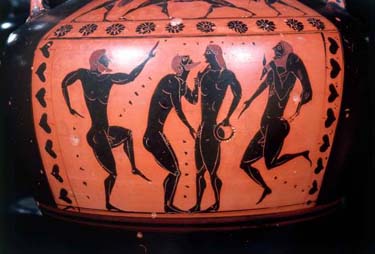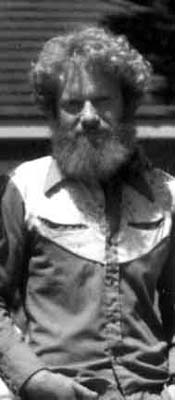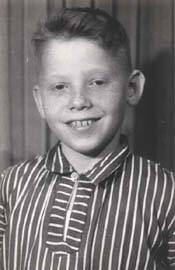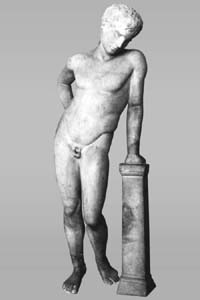 |


|
|
with Andrew Callimach |
|
An Interview by Raj Ayyar
As it is, the reader wants more as Andrew breaks off, not the story but the philosophizing, like a deft latter day Shahrazade. Also, the weaving motif persists in the retelling of the stories, since the book furnishes connections between many of the stories and a thin line of relationship between characters and plots from Tantalus to Laius and Oedipus. Truly, a venture blessed by gray-eyed Pallas Athena herself, patroness of the 'weave' as she is the goddess of crafts and wisdom.... Raj Ayyar: Tell us a little about yourself, Andrew. You grew up in Romania, didn't you, under a brutal and oppressive dictatorship?
Raj Ayyar: Why Lucian rather than e.g. Plato's 'Symposium' or 'Phaedrus' as a dialogue peg on which to hang the coat of the myths? Wouldn't Plato have been a more stereotypically obvious choice? Andrew Callimach: I prefer to surprise the reader. Everyone has read Plato. And, more to the point, I find Lucian more fun, even outrageous, while Plato is a bit on the dry side. And this is supposed to be a fun book. Raj Ayyar: You said that Lucian was more fun than Plato. How do you deal with his misogyny? After all, his defence of male same-sex love appears to be based on a denigration of women. Plato, with all his dualism and his elitist defects, is more female-positive than many other Greek thinkers of his period. So much so that Martha Nussbaum calls him an 'early feminist.' What do you think? Andrew Callimach: His "misogyny" is outrageous nonsense drummed up for the occasion, as is his "homophobia." Peering at us between the lines of the dialogue is a sybaritic consciousness that is having a bit of rollicking good fun, but that is far to savvy to pass up a night in bed with either a voluptuous beauty or with a supple lad. An important part of Lucian's work is a wildly romantic and idealistic paean to friendship. He really is quite eloquent. Thus Callicratidas goes from being catty and snippy when talking about women to being dewy eyed and maudlin when effusing about boys. And Charicles is no better. I would not take Lucian too seriously in any of this. My knowledge of Plato is rudimentary at best. But the argument is moot, since my intention in introducing the Lucian was to amuse first, and to edify second. And I find the whole piece fascinating, in that it sheds a stunning light on ancient mores, stunning because it reveals them to be so alike to modern ones. Women who dye and curl their hair, who wear tight shoes to make their feet seem small? What could be more familiar? And by revealing the similarities between human nature then and now, it makes the discussion on sexuality that much more immediate.

Raj Ayyar: I notice that in your eloquent transcreation of the Achilles-Patroclus relationship, you glide gently over the death of Hector. Yet, Homer goes on and on about it savoring every gory detail with lurid descriptiveness. His text is charged with a sadistic eroticism, metaphors of sexual arousal and complex analogies between killing and sexual conquest/submission. Thus, Hector says that "Achilles will cut me down in cold blood if I take off my armor and go out to meet him naked like a woman. This is no time for talking, the way a boy and a girl whisper to each other from oak tree or rock, a boy and a girl with all their sweet talk." An indication of the submerged homoerotics of the blood lust of Achilles and Hector. Again, the gruesome scene where the Greeks admire Hector's dead beauty, prodding the cold flesh and taunting his 'hardness' gone 'soft' in death. (Stanley Lombardo's translation of the Iliad, Book 22, 400f. and Book 22, 139f.). Any comments? Is there a secondary Hector/Achilles denied warrior erotic axis apart from the more obvious Achilles/Patroclus axis? So, perhaps in Homer as in much of ancient Greek culture, we find two different kinds of love: the tender love of erastes and eremenos (Achilles and Patroclus) and the brutal blood-filled death lust of the macho warrior for whom death and sexual conquest are congruent and analogous.
Raj Ayyar: The book jacket of Lovers' Legends mentions your continued interest in research on same-sex relationships. Do you have any new projects in mind? Andrew Callimach: The book originally was going to be an encyclopaedic work on myths and legends from around the world. There is a lot of ground to cover, the Arab / Persian / Mughal world, China, Japan, the Americas. At some point I would like to go further, but not till I have seen to it that the present work is firmly established. Raj Ayyar: What about cross-cultural gay mythic studies that show the similarities and differnces between gay myths from around the world, rather than an encyclopedia? Andrew Callimach: Will Roscoe has done a great deal along those lines, and is far more qualified that me to pursue that avenue. And Gilbert Herdt has also done a great deal of anthropological work with modern tribal societies that incorporate homoerotic rituals in their coming-of-age process. And we might pull in modern leather culture with their ritualized daddy/boy relationships. But for what you propose we would need someone with Joseph Campbell's integrative acumen. Though I will mention here that I was fascinated by the shamanic component of some of the myths. It is not what we expect when we think of Greek mythology, especially because the Classical Greeks themselves seem to have lost awareness of that connection.
Raj Ayyar: Do you have any suggestions for getting past the censors and guardians of education so that educators can rekindle the interest of the young in Liberal Arts by restoring the erotic juices as well as the blood and guts of myths from around the world? Andrew Callimach: There are a great many books now being written for young people, books expressly dealing with issues of growing up gay, or being raised by gay parents. To my mind it is a small step from that to exposing young people to the gay stories of their own ancestors. Indeed, a strong argument could be made that these ancient stories should be presented everywhere, even in school districts which reject books like Daddy's Roommate for being too redolent of social engineering. Who could accuse the Greek myths of social engineering? Indeed, trying to censor them now that they have been restored would be the very act of social engineering that certain groups seem to want to avoid. Raj Ayyar: What about a work similar to 'Lovers' Legends' with myths that favor a lesbian slant? Andrew Callimach: Oh, how I would have loved to weave them in as well! I simply do not know of any. I would like to think that they existed, and that in the feasts and mysteries reserved for women they were known and they were told. But it should not surprise us that they did not survive, since the oppression of women in ancient Greece was in some respects similar to that inflicted by the Taliban in Afghanistan. Raj Ayyar: What about your evident affection for Ginsberg? Did you meet him? Andrew Callimach: Yes, and we had a couple of opportunities to talk. His courage stunned me. He just let it all hang out, but he was anything but sloppy. He was like that, a man of many contrasts, very warm and generous, but very sharp and incisive at the same time. At any rate, I was very taken with him, there was real authentic presence about the man. Raj Ayyar: I have always enjoyed his zany Beat Zen attitude toward life... Andrew Callimach: Well, I am a Buddhist too and an atheist of sorts. It is hard to say what Buddhism goes with, nothing and everything. Experience has left me with a perception of a world that is both profound and meaningful. My atheism is a long shot from that dogmatic atheism, that barren rational empiricism I brought with me from the communist world. But it is just as far from the secular materialism hiding behind a mask of religiosity that seems to be the flavor of the day. Can we call it a mystical atheism, a perception that there is no one there to save your ass, but that salvation is absolutely crucial? Raj Ayyar: I love your suggestion at the end of the book that outing our mythic Greek ancestors lovingly may lead to a re-evaluation of who we are and of our 'conventional' Western pigeonholing of erotic experience. Don't you think that there are built-in systemic safeguards that ensure that this kind of re-evaluation does not happen too often or on a large scale? Hence the censors and guardians? Andrew Callimach: Our experience of ourselves is in constant flux, and the release of these myths into the public consciousness is part of that flux, made possible by it, and furthering it along. Thus the fact that these myths have re-entered the world now, after being largely lost for two thousand years, is both an expression and a creation of Zeitgeist. We cannot imagine what today's adolescents will grow up like, exposed to a world that has suddenly woken up to the fact that the persecution of gays is a war on love, and that homophobia is a perversion. I posit that the re-evaluation you and I invoke is already well under way. Raj Ayyar: Andrew, it's been fun swapping insights with you! Andrew Callimach: Likewise, Raj. |

© 1997-2002 BEI
 Andrew Callimach examines mythology and homosexuality in Lovers' Legends: Gay Greek Myths
Andrew Callimach examines mythology and homosexuality in Lovers' Legends: Gay Greek Myths  Andrew Callimach at age 10, when he began reading mythology in earnest
Andrew Callimach at age 10, when he began reading mythology in earnest  Narcisse
Narcisse